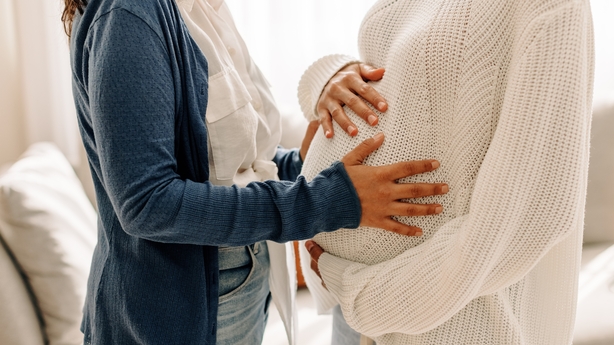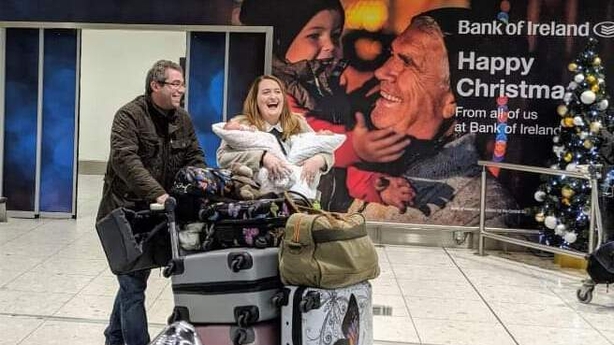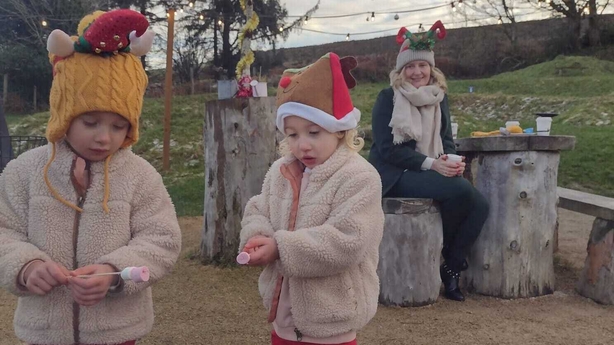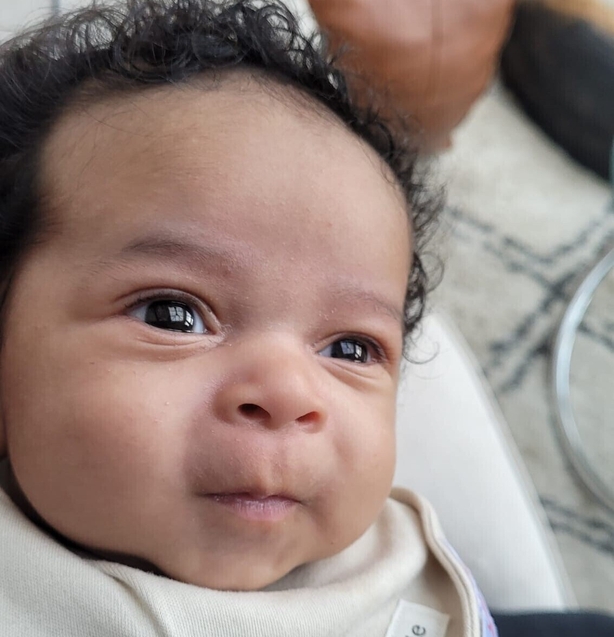Serious concerns have been raised about new proposals that aim to regularise surrogacy arrangements.
The Minister for Health announced the amendments to the Human Reproduction Bill on Wednesday, after the Government approved them.
Stephen Donnelly said the provisions in the Bill "have the potential to provide hundreds of Irish families with a route to formal recognition by the State of surrogacy arrangements they have undertaken, or will undertake, either domestically or in other jurisdictions".
This is likely the most significant change for families in Ireland who already have children through surrogacy.
It means they will finally be able to have their legal status as parents recognised, a situation which affects women disproportionately.
As Irish law currently stands, the woman who gives birth to a child remains the legal mother, causing legal difficulties and significant personal distress to mothers whose children are born via a surrogate.
In many cases, however, the father of the child who is genetically related to them will be recognised by an Irish court as the legal father.

The Bill will outlaw commercial surrogacy, and speaking on Prime Time earlier this week, Minister Donnelly said the ban on surrogate mothers making a "profit" from the arrangement followed a recommendation by the Oireachtas Committee on International Surrogacy.
In its final report in July 2022, the Committee said the new law should ensure "that no payments have been made to the surrogate beyond reasonable expenses so that she is not left at a financial loss by the process".
This means that only so-called altruistic surrogacy arrangements will be permitted going forward, but how realistic is that?
Senator Mary Seery Kearney, who has an eight-year-old daughter, Scarlett, born through surrogacy, says she has some concerns about the proposals, and that "the devil is in the detail".
She says what has been outlined so far is "pretty comprehensive" but she is keen to see how the proposals are transposed into law, and the implications of that.
She says it is vital that all families can access surrogacy and believes that this is what is intended by the Bill but she is worried that same-sex couples could be disadvantaged.
Some countries do not allow same-sex couples to avail of surrogacy arrangements, and the new proposals only apply to countries where surrogacy is legal.
Further limiting couples’ access to surrogacy is the fact that several countries have banned commercial arrangements in recent years, for example India and Thailand.
Minister Donnelly admitted in his interview with Sarah McInerney on Prime Time that the fact that countries like Georgia ban same sex couples "is a concern, there’s no question about it".
Since the war in Ukraine, many Irish couples have turned to Georgia for surrogacy, as it has the legal infrastructure, and is relatively affordable.
Part of the Bill is the establishment of an Assisted Human Reproduction Regulatory Authority, which will oversee the sector.
Minister Donnelly said the Authority would look at countries around the world where surrogacy was legal, saying: "It would be our intention that there are jurisdictions that any couple would be able to apply to whether heterosexual or same-sex couples."
He also said the legislation was open to review if it proved unworkable.
Senator Seery-Kearney said she could see "reasonable cause for alarm" for same sex couples.
She fears the creation of a two-tier system, that some couples who could afford it would go to the United States and spend around €150,000, while others might be forced to go to countries where the regime was less than ethical, and where homosexuality might even be illegal.
There are also concerns about the purely altruistic nature of surrogacy contained in the proposal.
Senator Seery Kearney says it is "overly idealistic [to think] it's ok for the doctors, lawyers, everyone else to get compensated but not the surrogate".
She believes that if the law is not practically applied, it would be "prohibition by stealth".
Senator Seery Kearney says she wants "very clear ethical routes that same sex couples can go to - but if it’s altruistic only, there won’t be anywhere."
It is a concern shared by Cathy Wheatley, herself a mother of twins born via a surrogate.
She says that "if commercial surrogacy is out of the question, [same sex male couples] won’t be able to avail of surrogacy and that’s the only way for them to be parents".
Ms Wheatley is a spokesperson for Irish Families Through Surrogacy (IFTS) which has long campaigned for what is called compensated surrogacy.

"We agree there needs to be regulation [but] it’s crazy to think the agencies, clinics, embryologist, everyone is getting something out of this, but there’s no reason why the surrogate mother shouldn’t be able to have something nice as well."
"Of course you want to cover their costs, but I also want to do something nice for her kids," says Cathy.
"I feel like it’s a shame that they can’t see that we’re not talking about thousands of euros, Ivana (her twins' surrogate mother) got €14,700. That’s a lot in Ukraine, but it’s not life-changing."
Despite Ms Wheatley’s reservations, she says IFTS is "very happy so far. Any step forward towards legislation is very welcome."
She also welcomed that Minister Donnelly took the time to talk to affected families.
She said department officials demonstrated they are "keen to get it right, they know this is something that really affects children now and future children".

Professor Deirdre Madden from the school of law in University College Cork also welcomes progress on the matter but says her main issue with the proposed legislation is the question of compensation.
She does not think it is realistic that women living abroad are going to engage in purely altruistic surrogacy.
"You’re not going to find a stranger to carry a child without being paid," she says.
She believes that this will drive people to go for commercial surrogacy, which in some countries is unregulated, poses a greater risk of exploitation of surrogate mothers and at the end of the process, there still will not be legal recognition for the families in Ireland.
Prof Madden does not believe the legislation, as proposed, will work, and is disappointed the Government appears not to have taken legal expertise provided to the Oireachtas Committee on International Surrogacy onboard.
"They know that. They were told that by almost every lawyer that it wouldn’t work.
"Despite all the evidence that I and others gave to the Committee, they haven’t changed their perspective."
She says the stigma around payments to surrogate mothers is not shared by intended parents and surrogate mothers and asks, "is it more morally satisfactory asking them to carry [the baby] for nothing?"
She also says that in purely altruistic arrangements, the overall cost to intended parents is roughly similar, but the money goes to all the people involved except the surrogate mother.
Prof Madden says there are lots of cases in the UK where couples have gone abroad and have paid in excess of what anyone would say is reasonable for surrogacy and then apply for their parentage to be recognised.
She says the judge is then confronted with a policy which says the government has set its face against such payments, but rightly has to prioritise the welfare of the child.
"What else can courts do?" asks Prof Madden.
"Send [the child] back to Mexico or send them to State care - none of those are child-centered policies."
Prof Madden says there are elements of the proposals that are well thought out, but in all she says it is flawed and will be "circumvented by people".
New Dad, Dominic Little, has not had the chance to go through the proposals, but recalls receiving an optimistic letter from Taoiseach Leo Varadkar last summer who said progress was being made on the issue.
Mr Little and his husband Bob McCullagh spent six years and tens of thousands of euros in their quest for a child.
Mr Little says being a same-sex couple reduced their search field significantly and that it can be "much cheaper for heterosexual couples".
Their options were limited and they quickly ruled out Mexico for safety concerns, and were advised against Greece too.
Mr Little says the US was prohibitively expensive with costs ranging from €150,000 to €200,000 for the whole process.
Mr Little and Mr McCullagh turned to Canada for surrogacy as it was slightly more affordable and they liked the outlook and better health system for the surrogate mother.
The couple welcomed baby Theo in June and are thrilled, saying he is a very good baby, but admit the red tape was stressful.

Under Canadian law, they were able to have all three names on the birth certificate.
Then, with the consent and blessing of the surrogate mother, who is not genetically related to Theo, they had her name removed from the birth cert by court order.
But under Irish law, the surrogate mother is still recognised as the legal mother, which is a source of upset and worry for Mr Little and Mr McCullagh.
While Mr Little is the genetic and legal father of Theo, Mr McCullagh will have to wait two years before being able to adopt his son.
Mr Little also feels they were discriminated against when it came to parental or paternity leave.
His employer, the Department of Education, said he was not entitled to any leave, even though he is Theo’s genetic father and is legally recognised as such in Ireland.
Luckily, his husband's employer, Ornua, said that even though he was not entitled to any leave, they arranged six months 'maternity leave’ for him, which has helped the couple immensely.
They are looking forward to their first Christmas with baby Theo, and will be closely watching the progress of the Assisted Human Reproduction Bill, to legalise their situation.







